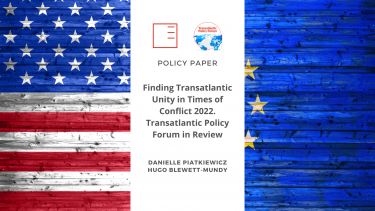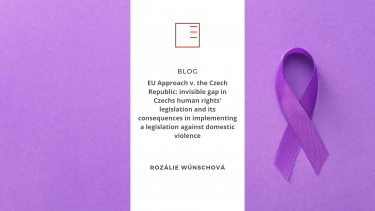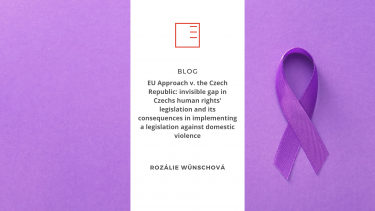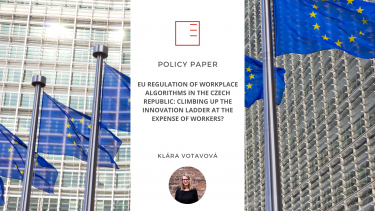POLICY PAPER: Finding Transatlantic Unity in Times of Conflict 2022. Transatlantic Policy Forum in Review
Our researchers Danielle Piatkiewicz and Hugo Blewet-Mundy have written a policy paper on "Finding Transatlantic Unity in Times of Conflict 2022. Transatlantic Policy Forum in Review" which aims to outline action points and proposals that the Transatlantic Partnership should adopt.
Show more PDFPOLICY PAPER | Hledání transatlantické jednoty v době konfliktu 2022. Přehled transatlantického politického fóra
Naše výzkumná pracovnice Danielle Piatkiewicz a Hugo Blewet-Mundy napsali policy paper na téma "Finding Transatlantic Unity in Times of Conflict 2022. Transatlantic Policy Forum in Review", který má za cíl nastínit akční body a návrhy, které by mělo transatlantické partnerství přijmout.
Show more PDFPOLICY PAPER | QMV in CFSP: Impending necessity or resurfacing utopia?
Miroslava Pisklová writes about a discussion on potential broadening of the qualified majority voting (QMV) system to more of the remaining policy areas in the Council of the EU in which it is not yet used, namely the EU´s Common Foreign and Security Policy (CFSP) that has recently gained momentum. This publication aims to analyse the advantages and disadvantages of introduction of the QMV in CFSP of the EU with a focus on the potential impact on smaller member states.
Show morePOLICY PAPER | Kvalifikovaná většina ve Společné zahraniční a bezpečnostní politice: Blížící se nutnost nebo znovu objevená utopie?
Miroslava Pisklová píše o diskusi o možném rozšíření systému hlasování kvalifikovanou většinou (QMV) na více zbývajících oblastí politiky v Radě EU, v nichž se dosud nepoužívá, konkrétně na společnou zahraniční a bezpečnostní politiku EU (SZBP), která v poslední době nabírá na síle. Cílem této publikace je analyzovat výhody a nevýhody zavedení QMV v SZBP EU se zaměřením na možný dopad na menší členské státy.
Show morePOLICY PAPER | Shifting the gender quota debate from underrepresentation of women to overrepresentation of men within diplomacy
Ivana Uličná writes about the fact that even though some progress has been made towards gender equality in diplomacy, women remain underrepresented in ambassadorial positions worldwide. Quotas have been effective in boosting nominal representation of women but critiques focused on quotas being tokenistic and harming meritocracy place a double burden on women. However, even the current system is not meritocratic, as men benefit from a historical advantage and assumed competence, while women must justify their presence, prove their worth and disprove gender stereotypes.
Show morePOLICY PAPER | Diskuze o genderových kvótách se posouvá od nedostatečného zastoupení žen k nadměrnému zastoupení mužů v diplomacii
Ivana Uličná píše o tom, že i když bylo dosaženo určitého pokroku v oblasti rovnosti žen a mužů v diplomacii, ženy jsou na velvyslaneckých postech po celém světě stále málo zastoupeny. Kvóty byly účinné při zvyšování nominálního zastoupení žen, ale kritika je převážně zaměřená na to, že kvóty jsou symbolické a poškozují meritokracii, což je pro ženy dvojí zátěž. Ani současný systém však není meritokratický, neboť muži těží z historické výhody a předpokládané kompetence, zatímco ženy musí svou přítomnost obhájit, prokázat svou hodnotu a vyvrátit genderové stereotypy.
Show moreBLOG: EU Approach v. the Czech Republic: invisible gap in Czechs human rights' legislation
Rozálie Wünschová writes in her blog that the Czech Republic is one of only two EU countries where corporal punishment of children is still legally permitted. Together with Slovakia, this puts the Czech Republic behind not only the Nordic countries, where corporal punishment was banned in the last century but also countries such as Turkmenistan, which adopted protective legislation in 2007.
Show more PDFBLOG: Přístup EU v. Česká republika: neviditelná mezera v českých právních předpisech
Rozálie Wünschová ve svém blogu píše, že Česká republika je doposud jednou ze dvou zemí EU, kde jsou tělesné tresty dětí stále legálně povoleny. Společně se Slovenskem tak Česká republika zaostává nejen za severskými zeměmi, kde byly tělesné tresty zakázány již v minulém století, ale také za zeměmi jako Turkmenistán, který přijal ochrannou legislativu v roce 2007.
Show more PDFReport | Monitoring of the EU's Green Policies: Perceptions and Narratives in the Czech and Slovak Information Space
The European Green Deal is the core of the current climate strategy of the European Union, which has set the goal of making Europe a carbon-neutral continent by 2050. In an effort to monitor and counter disinformation narratives about the deal, IRI's Beacon project launched an initiative called the “European Green Deal: Mapping perceptions in Central and Eastern Europe,” in which six partner organizations studied how the deal is perceived in Bulgaria, Czechia, Poland, Romania, and Slovakia. Our project manager and juniour researcher, Tatiana Mindeková, analyzed narratives spread about the Green Deal and the EU’s green policies through Czech chain emails as well as through selected mainstream media and websites known for spreading disinformation.
Show more PDFPolicy Paper | EU Regulation of Workplace Algorithms in the Czech Republic: Climbing up the Innovation Ladder at the Expense of Workers?
Our researcher Klára Votavová has written a policy paper in which she discusses the new dilemmas concerning the balance of competitiveness and decent work standards in the Czech Republic, which are emerging with advancing digitalization and automation.
Show more PDFStaroměstské náměstí 4/1
Prague 1 - Staré Město
110 00
tel.: +420 212 246 552
email: europeum@europeum.org
https://www.europeum.org







